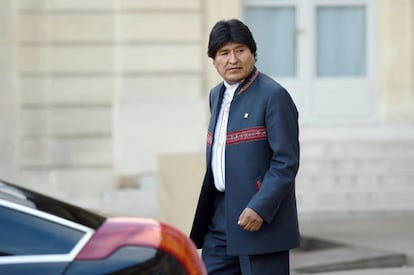Bolivia’s Morales apologizes for homophobic remark about minister
Feminist and LGBT groups say president’s comments paint discrimination as normal

Facing a tough campaign for constitutional reform that would allow him to run for a fourth term in 2019, Bolivian President Evo Morales has landed himself in trouble with feminist and LGBT groups for a homophobic comment he made at a public event.
Morales has had to apologize for scolding his health minister, Ariana Campero, for not paying close attention to his speech on Monday at a ceremony to hand over some new ambulances.
I hate to think you are a lesbian,” Morales told Health Minister Ariana Campero
“I hate to think you are a lesbian,” he told Campero.
After the comments went viral on social media and protests were lodged by Bolivia’s gay and lesbian community, Morales issued a public apology online.
“To say, or to ask, or to think whether someone is lesbian or gay is not an insult or an offensive remark,” read Morales’ statement, posted on the Communications Ministry’s website. “I and my government have nothing against anyone’s sexual preferences […] I humbly and sincerely apologize. It wasn’t my intention to offend anyone.”
A bachelor with two children out of wedlock, this is not the first time that Morales has caused controversy with his sexist jokes and politically incorrect statements about women.
“I once said that I would spend my last years with my coca bag, my 15-year-old girlfriend, and my guitar,” he said in 2008.
On another occasion, during a visit to a petroleum field in 2012, Morales asked two young women: “Let me hear you say, drill, drill.” His comments sparked laughter among the crowd.
Morales, an Aymara Indian and former coca grower, is facing a grueling battle with Bolivia’s middle classes to convince them to back a constitutional reform that would give him a chance to seek a fourth term in office in 2019.
Before the 2014 elections, his Movement toward Socialism (MAS) party painted Morales “as a feminist who likes to make sexist jokes.” Party officials claimed that more women hold public positions now than at any other time in the country’s history.
Health Minister Ariana Campero, a 28-year-old single woman, is a prime example of Morales placing women in high-profile roles. But at the same time she has been the victim of similar public comments made by a governor and even Morales’ vice-president about her private life.
According to feminist groups, the president’s behavior and the government’s general attitude towards women make discrimination seem “normal” in a country where gender violence is rampant. Around 100 women are killed each year by their partners.
English version by Martin Delfín.
Tu suscripción se está usando en otro dispositivo
¿Quieres añadir otro usuario a tu suscripción?
Si continúas leyendo en este dispositivo, no se podrá leer en el otro.
FlechaTu suscripción se está usando en otro dispositivo y solo puedes acceder a EL PAÍS desde un dispositivo a la vez.
Si quieres compartir tu cuenta, cambia tu suscripción a la modalidad Premium, así podrás añadir otro usuario. Cada uno accederá con su propia cuenta de email, lo que os permitirá personalizar vuestra experiencia en EL PAÍS.
¿Tienes una suscripción de empresa? Accede aquí para contratar más cuentas.
En el caso de no saber quién está usando tu cuenta, te recomendamos cambiar tu contraseña aquí.
Si decides continuar compartiendo tu cuenta, este mensaje se mostrará en tu dispositivo y en el de la otra persona que está usando tu cuenta de forma indefinida, afectando a tu experiencia de lectura. Puedes consultar aquí los términos y condiciones de la suscripción digital.








































